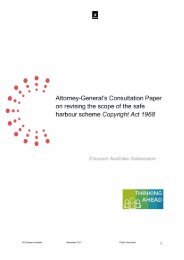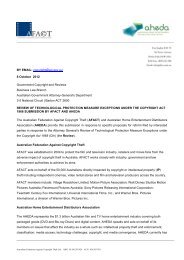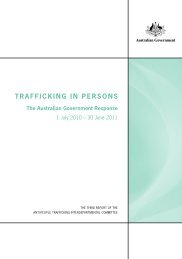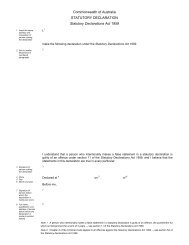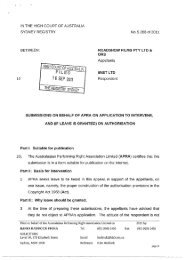Normann Witzleb [PDF 657KB] - Attorney-General's Department
Normann Witzleb [PDF 657KB] - Attorney-General's Department
Normann Witzleb [PDF 657KB] - Attorney-General's Department
Create successful ePaper yourself
Turn your PDF publications into a flip-book with our unique Google optimized e-Paper software.
of action. This would mean that a defendant needs to have been reckless in relation to<br />
the risk that his or her act would be highly offensive to a reasonable person of ordinary<br />
sensibilities, whereas the defendant does not need to have been reckless in relation to<br />
the plaintiff’s reasonable expectation of privacy nor of the fact that the plaintiff’s privacy<br />
interest outweighed countervailing public interest considerations. 60<br />
39 Understood in that way, a recklessness standard would require the plaintiff to show<br />
that the defendant was subjectively aware of the offensiveness of their conduct and<br />
chose to disregard this risk. Even if such a limited awareness of the defendant would be<br />
all that the plaintiff is required to prove, it must be questioned whether such a fault<br />
requirement is appropriate or whether it erects too high a hurdle for plaintiffs. If the<br />
requirement for recklessness were extended to the other elements of the cause of<br />
action, it would be even harder for plaintiffs to establish the requisite mental element.<br />
40 The limitation to intentional and reckless acts should be rejected. It would leave<br />
inappropriate gaps in the protection of privacy and also appears to be out of step with<br />
the general principles of liability for civil wrongs. The case of Jane Doe v ABC 61 provides<br />
a striking example of why limiting liability to intentional and reckless acts would exclude<br />
some deserving cases. In that case, the Australian Broadcasting Corporation reported in<br />
three radio news broadcasts that the plaintiff’s husband had been convicted of raping<br />
her. In two of these broadcasts, her estranged husband was identified by name and the<br />
offences were described as rapes within marriage. In another broadcast, Jane Doe was<br />
additionally identified by name. In all three broadcasts, the journalist and sub-editor<br />
breached the Judicial Proceedings Act 1958 (Vic), which makes it an offence to publish<br />
information identifying the victim of a sexual offence. Expert evidence established that<br />
the plaintiff was particularly vulnerable at the time of the broadcasts and that the<br />
reporting exacerbated her trauma symptoms and delayed her recovery. The defendants<br />
were thus guilty of a serious invasion of privacy with grave and long-lasting<br />
consequences for the plaintiff. Yet the trial judge, Hampel J, found that the breach of<br />
the plaintiff’s privacy was the result of the defendants’ failure to exercise reasonable<br />
care ‘rather than [being] wilful’. 62 If the ALRC proposal was enacted, a person in the<br />
position of the plaintiff in Jane Doe v ABC would not be able to rely on the statutory<br />
cause of action. This severely curtail the protection for privacy that the law should<br />
provide for.<br />
41 General principles of civil liability likewise do not provide a sufficient rationale for<br />
limiting liability to intentional or reckless conduct. While the ALRC expressly provides<br />
that the statutory cause of action is not a tort, it is desirable that differences in the<br />
protection of comparable interests are justified on policy grounds. The majority of torts<br />
intended to protect personality interests do not set the bar at reckless or intentional<br />
conduct. Defamation is a strict liability tort but provides faultless defendants with a<br />
defence in some cases. At common law and under the (Australian) Uniform Defamation<br />
60 In Campbell v MGN Ltd [2004] 2 AC 457; [2004] UKHL 22, a negligence standard was applied in relation<br />
to the reasonable expectation of privacy: see at [85] (Lord Hope).<br />
61 Jane Doe v ABC [2007] VCC 281. Hampel J found nonetheless in favour of the plaintiff because her<br />
Honour formulated the cause of action as an ‘unjustified, rather than wilful’ (at *163+) publication of<br />
private facts.<br />
62 Jane Doe v ABC [2007] VCC 281, at [163].<br />
14


![Normann Witzleb [PDF 657KB] - Attorney-General's Department](https://img.yumpu.com/26247895/14/500x640/normann-witzleb-pdf-657kb-attorney-generals-department.jpg)


